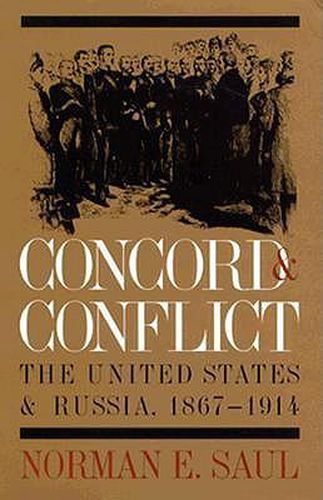Readings Newsletter
Become a Readings Member to make your shopping experience even easier.
Sign in or sign up for free!
You’re not far away from qualifying for FREE standard shipping within Australia
You’ve qualified for FREE standard shipping within Australia
The cart is loading…






In 1867 Mark Twain cruised into the Black Sea on the first American tourist ship to visit in Russia. Just a few years later Russian Grand Duke Alexis in turn was hunting buffalo and drinking champagne on the Nebraska prairie. Both were taking advantage of a growing, if precarious, alliance between two of the worlds most influential nations. In fact, as Norman Saul reveals, between 1867–the year of the Alaskan purchase–and the beginning of World War I, Russian and American dignitaries, diplomats, businessmen, writers, tourists, and entertainers crossed between the two countries in far greater numbers than was previously known.
Following the widely praised Distant Friends, volume one of Saul’s trilogy on Russian American relations, Concord and Conflict provides the first comprehensive investigation of this highly transformational and fateful era in Russian-American relations. Excavating previously unmined Russian and American archives, he explores the flow and fluctuation of economic, diplomatic, social, and cultural affairs; personal and professional conflicts and scandals; and the evolution of each nation’s perception of the other.
At first concentrating on their similarities following the American Civil War, Saul contends, the Russian and American people established a tradition of friendship in the absence of major controversy. In many ways, they felt bound by a sense of common destiny, corresponding periods of reform and progress, and a mutual hostility toward the older European powers.
Throughout Russia, American trademarks became familiar as U.S. companies such as Singer, New York Life, Westinghouse, and International Harvester took root. Hard winter wheat–today a vital American crop–was introduced by Russian immigrants. The Smithsonian established an information exchange with the Russian government. War and Peace was translated into English and widely distributed in the United States. And the first YMCA was established in Russia.
As progressive reform waned in 1880s Russia, however, Americans became increasingly leery of Russia’s repressive internal tactics, hostility toward Jews, open-door policy toward China, and expansion in the Far East while Russians found America’s actions and attitudes hypocritical and equally confusing. Yet despite deterioration of diplomatic ties, Saul shows, a semblance of kinship endured into the twentieth century as cultural exchanges and business opportunities continued to escalated.
Illuminating fifty of the most significant–and surprisingly open–years of this frequently tumultuous and contradictory association, Concord and Conflict reaffirms Saul’s status as the leading American authority on Russian-American relations before 1917 (Journal of American History).
$9.00 standard shipping within Australia
FREE standard shipping within Australia for orders over $100.00
Express & International shipping calculated at checkout
In 1867 Mark Twain cruised into the Black Sea on the first American tourist ship to visit in Russia. Just a few years later Russian Grand Duke Alexis in turn was hunting buffalo and drinking champagne on the Nebraska prairie. Both were taking advantage of a growing, if precarious, alliance between two of the worlds most influential nations. In fact, as Norman Saul reveals, between 1867–the year of the Alaskan purchase–and the beginning of World War I, Russian and American dignitaries, diplomats, businessmen, writers, tourists, and entertainers crossed between the two countries in far greater numbers than was previously known.
Following the widely praised Distant Friends, volume one of Saul’s trilogy on Russian American relations, Concord and Conflict provides the first comprehensive investigation of this highly transformational and fateful era in Russian-American relations. Excavating previously unmined Russian and American archives, he explores the flow and fluctuation of economic, diplomatic, social, and cultural affairs; personal and professional conflicts and scandals; and the evolution of each nation’s perception of the other.
At first concentrating on their similarities following the American Civil War, Saul contends, the Russian and American people established a tradition of friendship in the absence of major controversy. In many ways, they felt bound by a sense of common destiny, corresponding periods of reform and progress, and a mutual hostility toward the older European powers.
Throughout Russia, American trademarks became familiar as U.S. companies such as Singer, New York Life, Westinghouse, and International Harvester took root. Hard winter wheat–today a vital American crop–was introduced by Russian immigrants. The Smithsonian established an information exchange with the Russian government. War and Peace was translated into English and widely distributed in the United States. And the first YMCA was established in Russia.
As progressive reform waned in 1880s Russia, however, Americans became increasingly leery of Russia’s repressive internal tactics, hostility toward Jews, open-door policy toward China, and expansion in the Far East while Russians found America’s actions and attitudes hypocritical and equally confusing. Yet despite deterioration of diplomatic ties, Saul shows, a semblance of kinship endured into the twentieth century as cultural exchanges and business opportunities continued to escalated.
Illuminating fifty of the most significant–and surprisingly open–years of this frequently tumultuous and contradictory association, Concord and Conflict reaffirms Saul’s status as the leading American authority on Russian-American relations before 1917 (Journal of American History).